blip energy
Northwestern University
blip is a residential energy storage company created to democratize energy storage & accelerate the adoption of renewable resources.
2021 Winner: $100,000
Climate Change prize sponsored by Breakthrough Energy Ventures
- Pitching for greatness: 2022 ASUio Recap
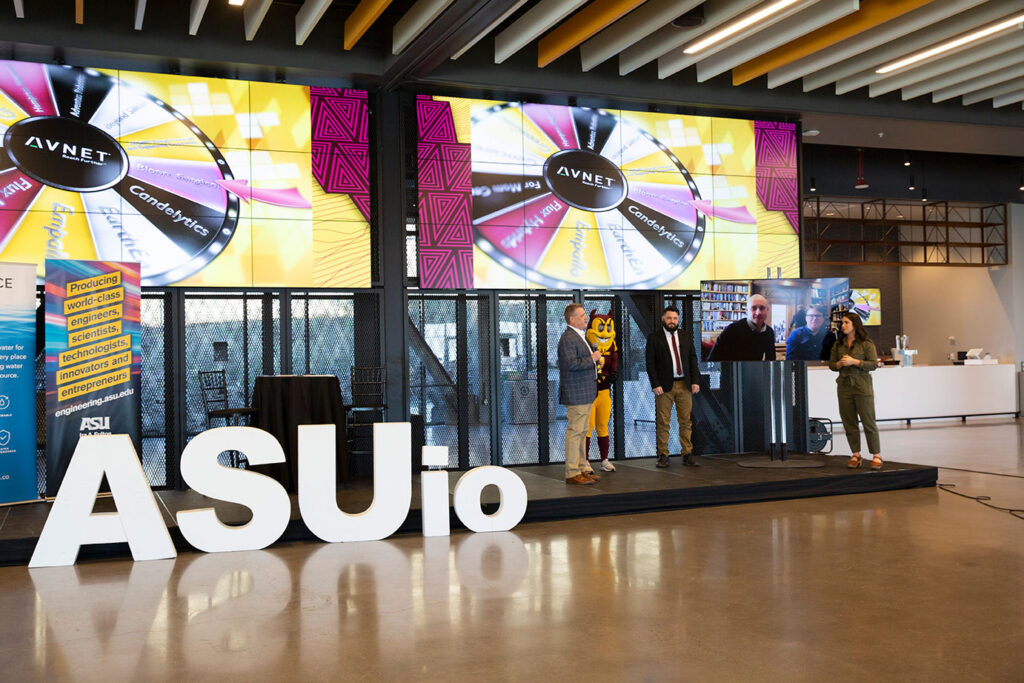
Pitching for greatness
Environmental and human health solutions take the stage at the 2022 ASU Innovation OpenForward thinking and creative solutions carried the day at the Arizona State University Innovation Open award show last Friday. Technology innovation and entrepreneurship were on full display at the event, known as ASUio, as 30 teams of students representing 20 universities gathered for the live, virtual event.
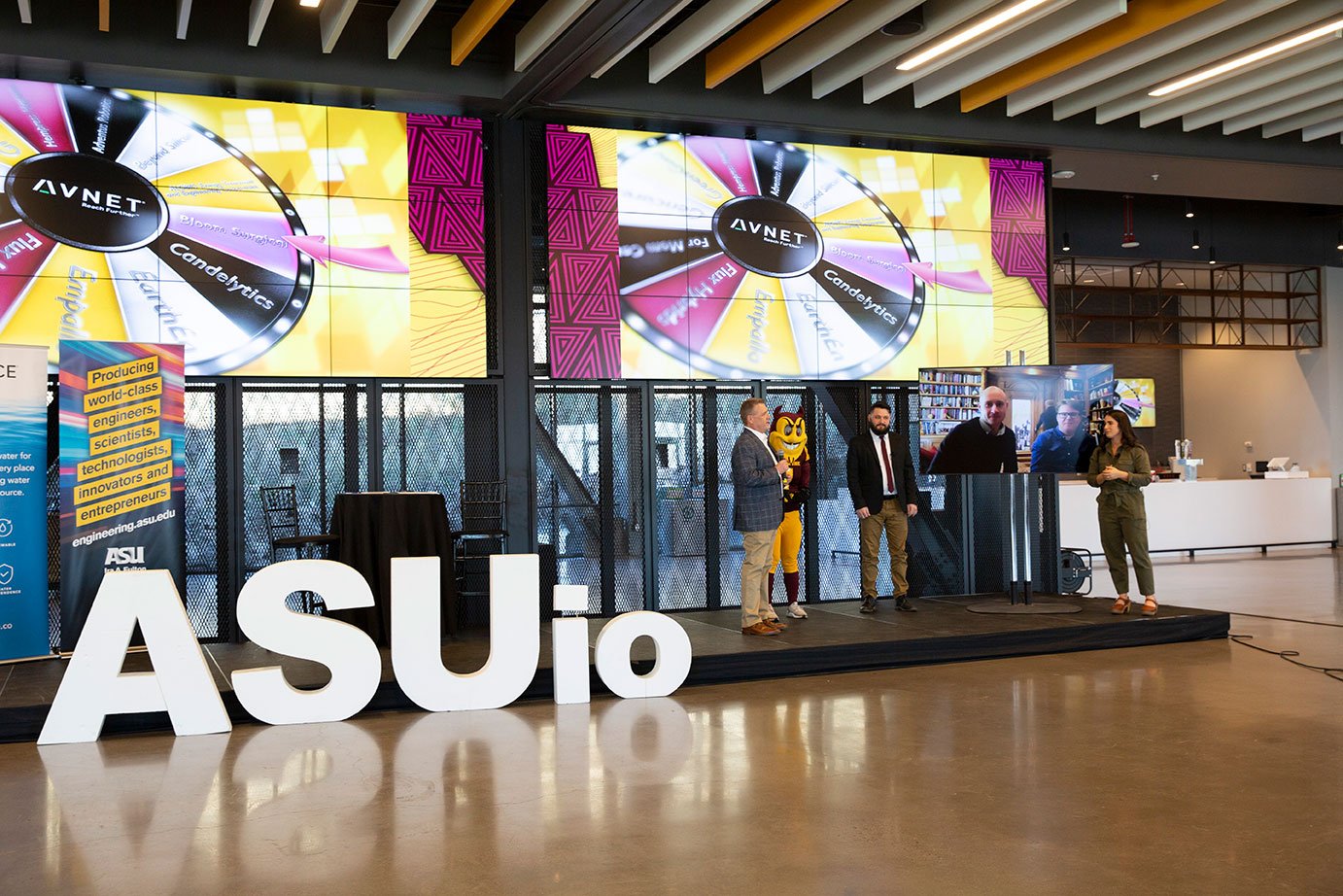
Scott Tippin announces Bloom Surgical as the winner of the $25,000 Connectivity Prize, sponsored by Avnet, at the 2022 ASU Innovation Open, also known as ASUio. Avnet has been a founding sponsor of ASUio since the competition began in 2017. Photographer: Erika Gronek/ASU In only its sixth year, ASU Innovation Open is gaining traction among young innovators as an excellent way to earn investment and mentorship — as well as to see how their ventures measure up against other startups being pitched by some of the most talented, enterprising student entrepreneurs in the world.
Hosted by ASU and the Ira A. Fulton Schools of Engineering, ASU Innovation Open invites collegiate teams to pitch their ventures to business leaders and technology developers from across the Phoenix metropolitan area who support the growing entrepreneurial ecosystem in Arizona and beyond.
In total, two teams left the 2022 event with $100,000 grand prizes powered by Breakthrough Energy Ventures and the ASU eSeed Challenge, while four others earned $225,000 in non-diluted cash to support their ventures from sponsors supporting the Fulton Schools mission of idea generation and social capitalism. These six teams represent the top ventures among the more than 100 collegiate teams that submitted pitches for a chance to win at ASUio 2022.
Kyle Squires, ASU’s vice provost of engineering, computing and technology and the dean of the Fulton Schools, views entrepreneurship as a vitally important complement to students’ growth and learning experiences as they train to become the engineering and technology leaders of the future.
“We have the easy part,” Squires says about encouraging and rewarding students who embrace the entrepreneurial mindset. “We provide the support, the structures, the people, the mentors — whatever it takes to get a venture moving. When we started ASU Innovation Open, we wanted to become the premier student entrepreneurial competition in the Southwest. We’ve achieved that. And so, as engineering becomes increasingly global, so too should entrepreneurial opportunities for students — and it’s why we’re proud this competition is attracting students from all over the world to compete to get to that next level.”
Primed for Impact
ASU Innovation Open awards startups with the potential to use engineering and technology to uniquely and positively make an impact in the world. InfernoGuard, winner of the $100,000 Climate Change Prize, sponsored by Breakthrough Energy Ventures, is already making a difference in communities where its modeling, software and hardware solutions are being tested to monitor environmental conditions and immediately notify landowners of wildfire threats.
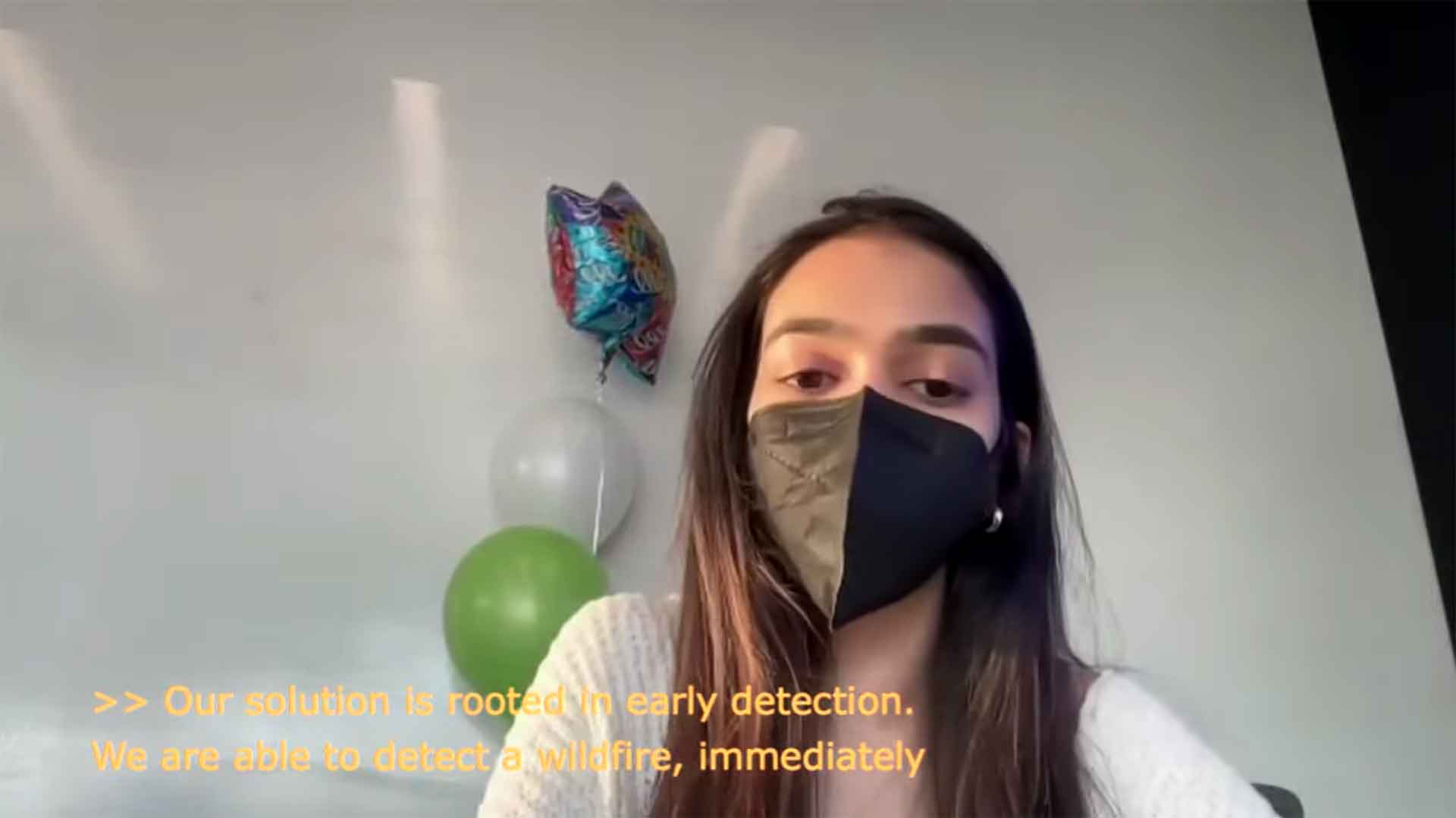
InfernoGuard Chief Operating Officer Nandita Balaji accepts the $100,000 Climate Change Prize, sponsored by Breakthrough Energy Venture According to Nandita Balaji, InfernoGuard’s chief operating officer, the idea for the company was born when she and her high school classmates saw the detrimental impact of smoke in their hometown from wildfires that were burning nearly 100 miles away.
Now a second-year neuroscience and computer science student at Johns Hopkins University, Balaji and her team have developed a device that accurately pinpoints fires and alerts users so they can respond quickly and prevent fires from spreading. Their solution has already gained support from farmers who see the team’s subscription-based detection service as far more cost effective than the potentially millions of dollars lost in damages caused by wildfires.
“The way that we think about climate change has become more pronounced,” says Peter Turner of Breakthrough Energy Ventures, a $2 billion climate tech venture capital firm founded by Bill Gates that invests in companies and technologies that radically reduce global carbon emissions. “We as a society are going to become uniquely more proactive about management of natural hazards like wildfires, and that’s just what InfernoGuard is doing. So we’re excited to support them on this mission.”
Students representing NearWave, a venture from the University of Notre Dame, could barely contain their excitement. The entire lab erupted into cheers when they learned they’d earned the $100,000 Pay it Forward Prize from the ASU eSeed Challenge. The eSeed Challenge is powered by the Prescott Student Venture Fund — a fund supported by Fulton Schools alumnus Tom Prescott, an avid supporter of ASU’s entrepreneurial programs and a speaker at the award show.
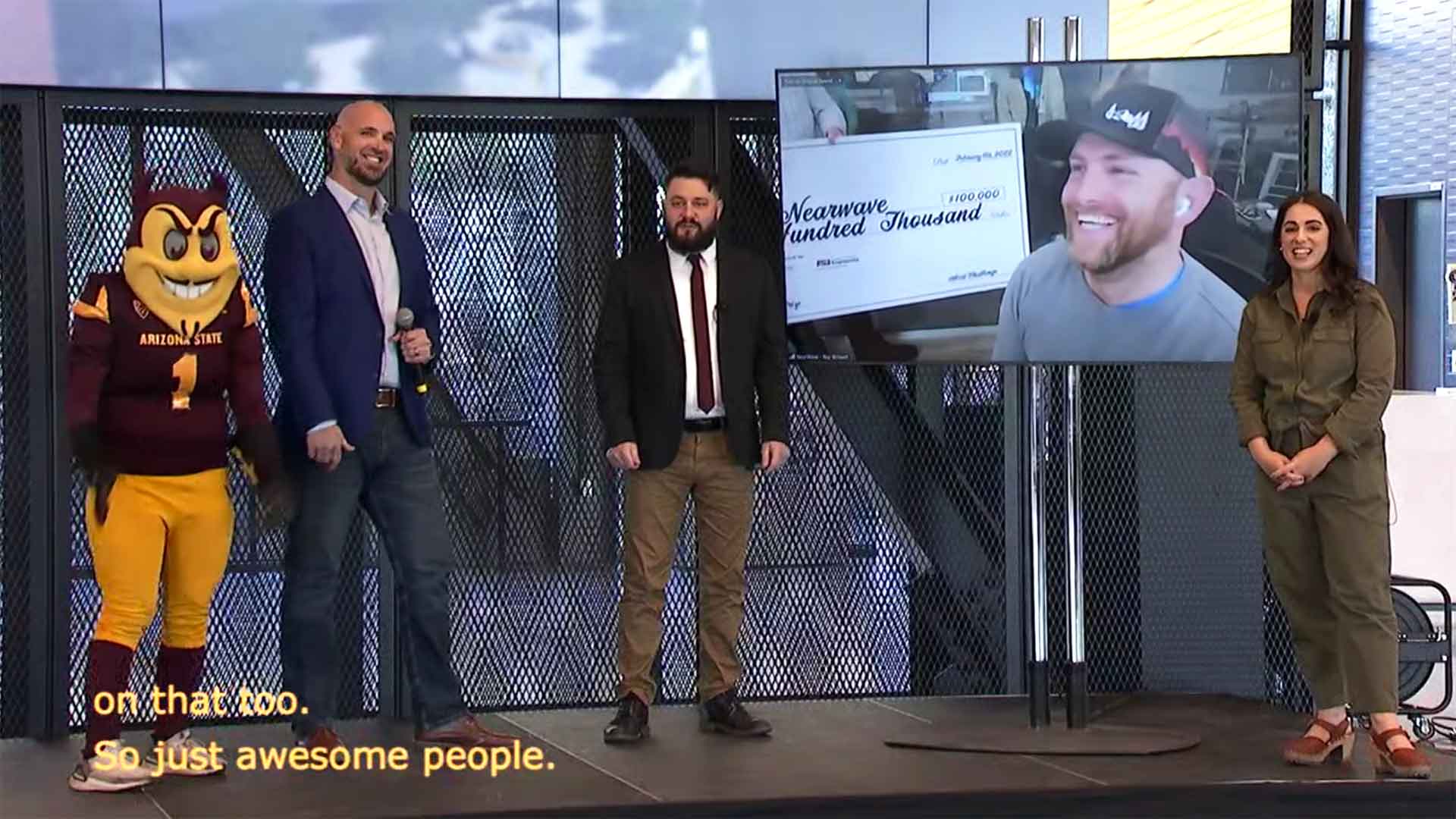
Brent Sebold, interim director for ASU’s Master of Science in Innovation and Venture Development program, announces CEO Roy Stillwell and NearWave as the $100,000 grand prize winner of the Pay It Forward Prize on behalf of Tom Prescott and the ASU eSeed Challenge. Photographer: Erika Gronek/ASU NearWave has developed a handheld, point-of-care imaging device that uses near infrared spectroscopy to monitor and diagnose breast cancer. Able to “see” through even dense breast tissue, the non-invasive technology device is helping clinicians make decisions about pre-surgery breast cancer treatment, often saving patients from enduring months of toxic side effects and/or ineffective treatment.
“Our approach is currently the smallest and the fastest by about 100 times of any device like this, research or commercial, in the world,” says Roy Stillwell, NearWave’s founder and CEO. “Generally, we can change chemotherapy regimes in a much quicker time period. We’ve done some work to show that within a week, we can tell whether or not someone’s responding to therapy rather than waiting until that three-month or six-month time frame. It makes a huge difference in the amount of chemotherapy these women have to undergo.”
Brent Sebold, the interim director for ASU’s Master of Science in Innovation and Venture Development program and the Fulton Schools director liaison to J. Orin Edson Entrepreneurship + Innovation Institute, presented the award and noted how impressed the judges were with the team throughout the competition and how transformative the technology can be for the medical community.
This year’s $50,000 Human Health Prize was sponsored by BD, or Becton Dickinson, a leading global medical technology company. They awarded Co-founder and CEO Casey Grage of Johns Hopkins University for the neurotech startup Hubly Surgical.
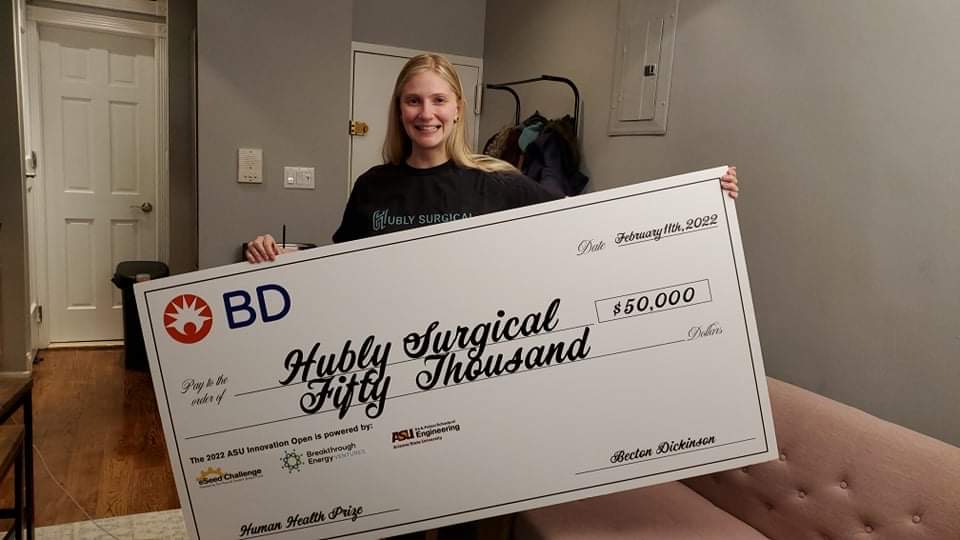
Johns Hopkins University student Casey Grage accepts the $50,000 Human Health Prize sponsored by BD for her medical device company, Hubly Surgical. Photo courtesy of Casey Grage. Grage and her team have developed the Hubly Drilling System, an advanced intracranial and orthopedic integrated electric drilling system with auto-stop and catheter guidance. It is designed to replace today’s standard for emergency neurosurgery. Using Hubly’s drill system that includes an auto-stop feature, and replacing industry-standard manual drills, would eliminate the potential for accidental drilling into the brain, which in total, costs the U.S. health care system approximately $4 billion each year.
“Hundreds of thousands of people have this [manual] drill go into their heads every single year with an incredibly high complication rate,” Grage says. “The very least we can do for these patients is give them the safest tools possible.”
Alex Lastovich, BD’s research and development director of innovation, noted that Hubly Surgical’s solution identified an unmet need in the health care space and lauded the team for having a clear plan for getting their solution into the hospital environment as reasons they selected the team for this award. Lastovich says Hubly Surgical has developed a device that can incredibly improve patients’ quality of life.
The other 2022 ASUio winners were:
-
Gencores, representing Harvard University and Massachusetts Institute of Technology, won the $25,000 Water Prize sponsored by SOURCE Global. The prize was presented to Co-founder and CEO Jules Thiery, whose company aims to transform transportation by unlocking high-volume manufacturing of high-performance composites. Gencores is seeking to transform transportation electrification by producing unique ultra-light foam composites for original equipment manufacturers.
-
Bloom Surgical won the Connectivity Prize sponsored by Avnet, earning $25,000 in cash. Jacob Sheffield of Brigham Young University accepted the prize on behalf of Bloom Surgical, which has created a minimalistic origami-inspired solution for clean laparoscopic lenses that can be used during minimally invasive surgeries, eliminating the need to clean the camera multiple times during surgery due to visual disruptions.
-
Shelly Xu, founder of SXD, or Shelly Xu Designs, won the $25,000 Digital Access Prize from Amazon Web Services. Xu is building a software application that seamlessly turns any design sketch and leftover or wasted fabrics into zero-waste clothing that looks beautiful and costs approximately 55% less to produce. Representing Harvard Business School, Xu, a designer, is combining design and tech to scale sustainable, aesthetic and efficient clothing.
Conversations between founders
The 2022 award show was not only about finding out who’d walk away with additional capital to fund their startups. Attendees also got tips and insights from business leaders, founders and former ASUio champions whose success has continued far beyond the competition.
Cody Friesen, the ASU Innovation Open founder, Fulton Entrepreneurial Professor and an associate professor of materials science and engineering in the Fulton Schools, welcomed the competitors and congratulated them on making it to the competition as finalists.
“Every year the contestants get better; every year the competition gets bigger,” Friesen said during the event. “We’re so excited about the range of students, the internationality of the competition this year, and just all the cool technology that students are bringing into companies and trying to bring out to the world.”
Friesen, who spun out his own company SOURCE Global (formerly Zero Mass Water), understands the challenges and opportunities the competitors may be facing as they establish their own ventures. Friesen and Neil Grimmer, founder and former CEO of Plum Organics who eventually sold the company for $250 million, shared stories about their individual entrepreneurial journeys and the importance of being open to applying different forms of technology as your company evolves. It’s one of the reasons Friesen was able to successfully transform his knowledge of the renewable energy space into a new hydropanel technology — a tangible product that people around the globe can use to get access to clean drinking water.
The two also noted the importance of collaborating with others with the right expertise and spoke of the opportunity they’ve had to work together as colleagues at SOURCE.
Two other founders who could directly relate to being in the competitors’ shoes were former ASU Innovation Open $100,000 grand prize winners Sophia Wennstedt and Katherine Sizov. Wennstedt is the the CEO and co-founder of blip energy, a company focused on democratizing energy storage and accelerating the adoption of renewable resources. Sizov leads Strella Biotechnology, which has developed biosensors that monitor ethylene production in fruit to help move produce to customers and help combat food waste.
Both companies have continued to gain momentum since their ASUio wins, despite setbacks and slow periods resulting from a global pandemic. Since winning ASUio last year, blip energy is expanding into new customer bases for its IoT energy resources and exploring new ways to launch their product. Meanwhile, Strella Biotechnology’s biosensors are being used by produce supply companies and grocery store chains throughout the country. The company continues to secure significant financing as it grows and expands.
The founders reflected on their own journeys and offered words of encouragement to all the student entrepreneurs watching the competition.
“It’s a really big accomplishment to even be competing and to be passionate about something — having thought through something so deeply and truly caring about it,” Sizov shared with attendees.
“It’s such an accomplishment to have gotten this far in terms of being in a competition like this,” Wennstedt added. “We made a ton of connections at competitions, but especially at ASUio last year. They were super helpful in us moving forward and making all the progress that we made in the year after that. So, congrats on being here. Keep on keeping on.”
Watch the full 2022 ASU Innovation Open broadcast, available now on YouTube.
-
- Imaginative solutions lead the way at 2021 ASU Innovation Open
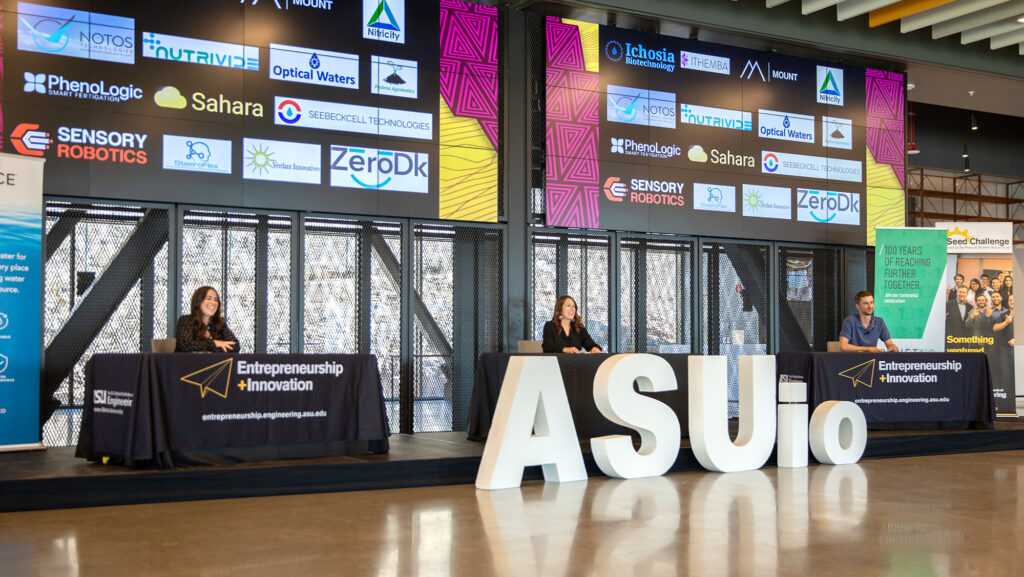
Imaginative solutions lead the way at 2021 ASU Innovation Open
Collegiate entrepreneurs from around the world win $340,000 in cash and services at 5th annual pitch competition.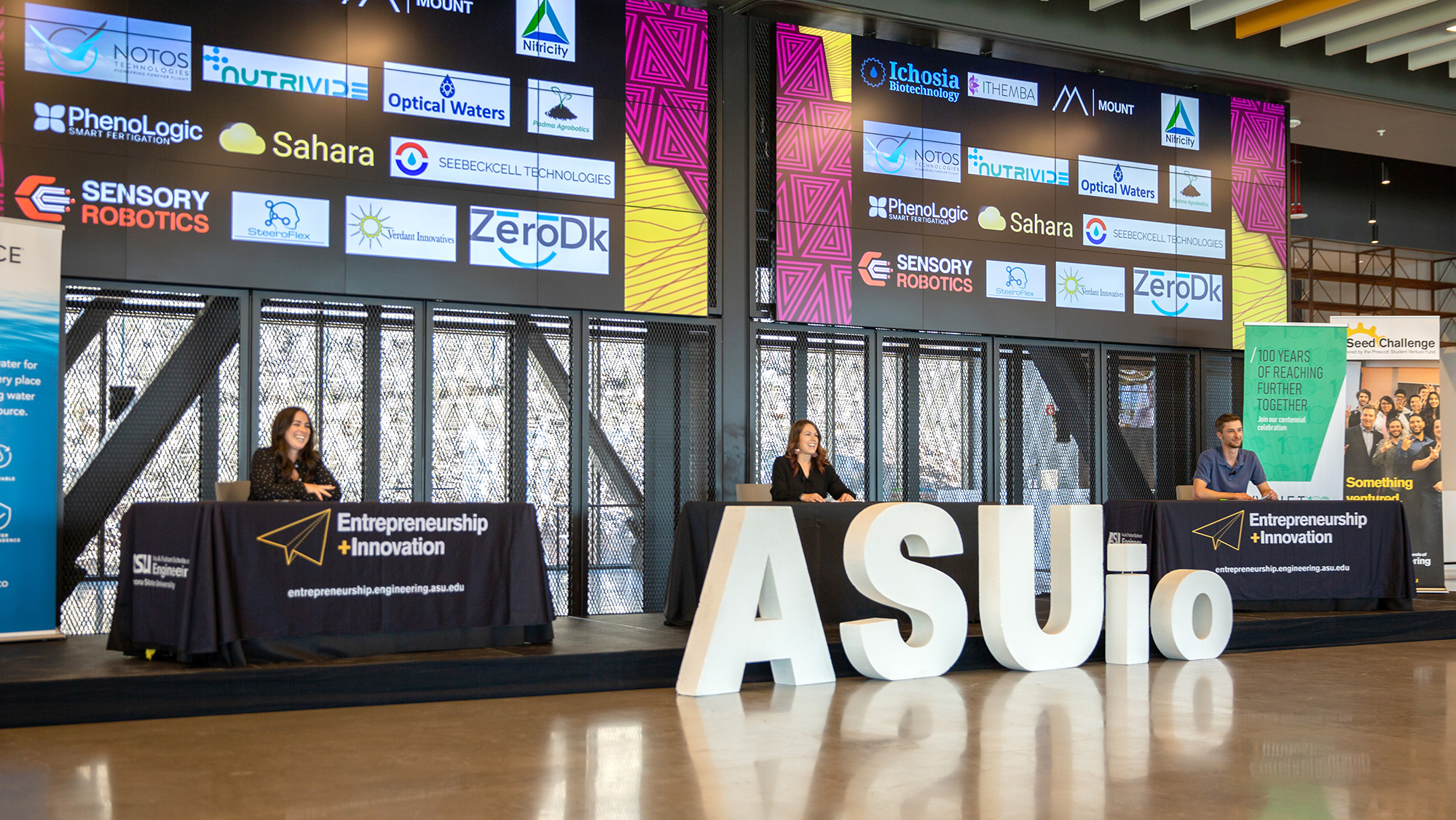
Above: The fifth annual ASU Innovation Open awarded seven teams more than $300,000 in prizes and in-kind services to support the advancement of their startups — including two $100,000 grand prize winners. Photographer: Connor McKee/ASU Clean tech and energy storage solutions emerged as the big winners at the fifth annual ASU Innovation Open.
In the competition’s first virtual event, spectators from around the world watched live as the student innovators waited to find out which ventures rose to the top. In all, seven teams won more than $300,000 in prizes and in-kind services to support the advancement of their startups — including two $100,000 grand prize winners.
Innovation is the driving force behind so much of the positive change we see in the world today. ASUio invites the highest level of collegiate entrepreneurs to compete against peers who are designing solutions to address the world’s most pressing challenges.
“Combining the drive of entrepreneurs with technology leaders like our sponsors, and an incredibly innovative university, ASU, we have been able to build a vibrant ecosystem,” said Cody Friesen, associate professor of materials science and engineering in the Ira A. Fulton Schools of Engineering at ASU and CEO of SOURCE Global, one of the ASUio sponsors. “Past participants have been highly successful and this program has proven beneficial to everyone involved. We’re especially excited about this cohort of amazing founders that are solving really important problems.”
Selected from over 100 teams — the most the competition has ever seen — 30 student ventures representing 25 universities were invited to participate as semifinalists in Friday’s event.
A team of judges, comprised of tech innovators, mentors, startup leaders and industry experts, had the difficult job of narrowing the playing field in one of the most competitive groups of ventures in the competition’s history. As the number of submissions grew, so did the diversity of the applicants. Sixty percent of the submitted ventures were minority-led, and women were at the helm of a full third of the teams.
One such team was ASU startup Optical Waters, co-led by Mariana Lopes, a recent PhD graduate from the ASU’s Fulton Schools of Engineering and Mariana Marcos, a current PhD student at the University of Texas at El Paso. Their team won the $25,000 Technology for Social Equity Prize sponsored by SOURCE Global, for their adjustable germicidal optical fibers that use light to eliminate biofilms in small tubes.
“Bacterial pathogens love to grow it in hard-to-reach areas,” explained Lopes. “They grow in your sink pipe, refrigerator, coffeemaker — anywhere that water flows through a piped channel, it can form a biofilm and infect users even after the water has been treated.”
Optical Waters’ technology has the potential to revolutionize human health by driving out the pathogens that exist in water distribution systems, storage systems and medical equipment, like catheters, endoscopes and endotracheal intubation devices.
The competition’s biggest winners are making headway with advances in IoT and energy solutions.
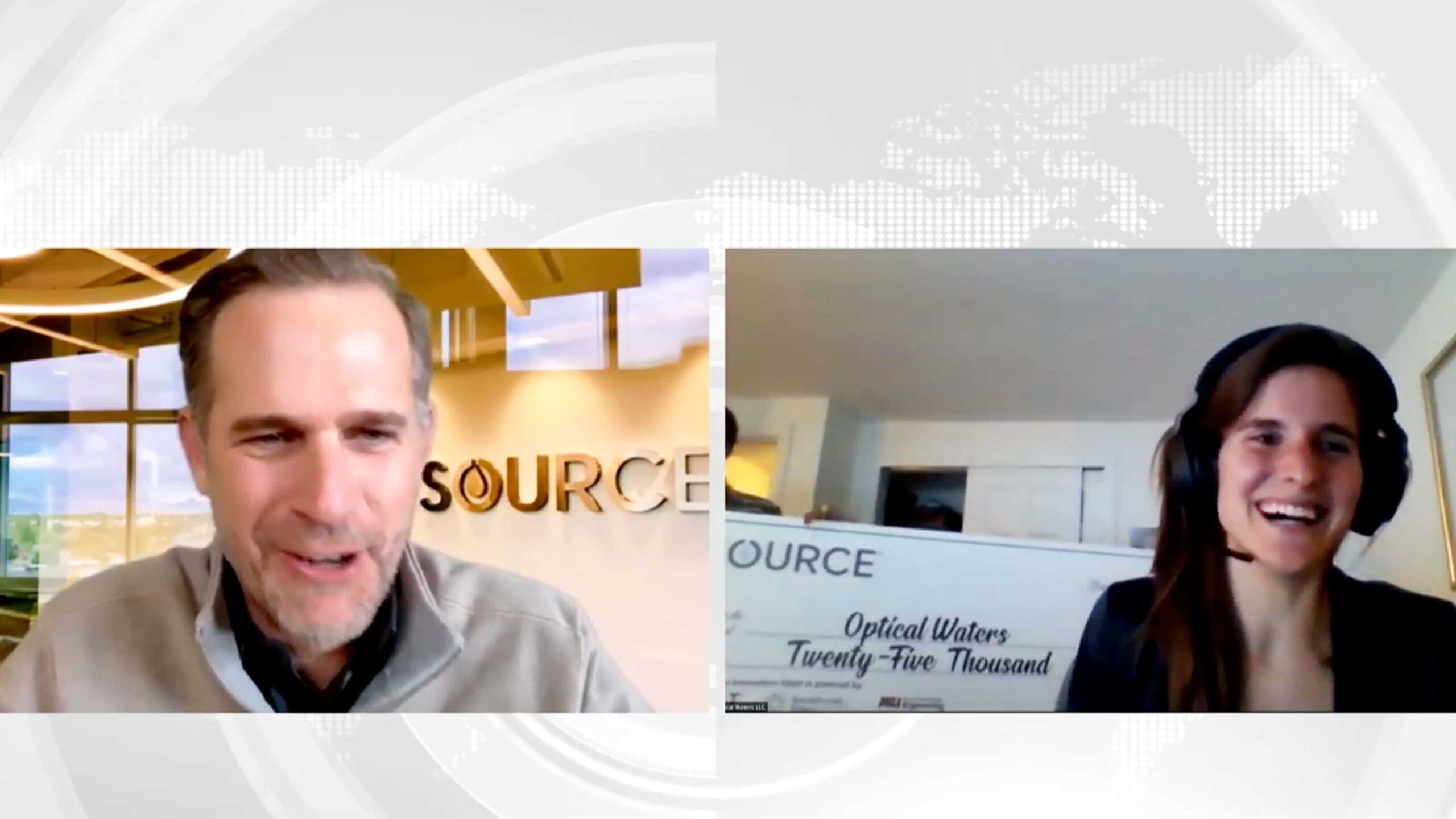
Fulton Schools Professor and SOURCE Global CEO Cody Friesen awarding the $25,000 Technology for Social Equity Prize sponsored by SOURCE Global to recent Fulton Schools doctoral graduate Mariana Lopes, CEO of Optical Waters during the 2021 ASU Innovation Open. David Dellal, a doctoral student at Yale University, won the $100,000 grand prize for IoT solutions from Avnet. His company, Floe, has developed a smart, cost-effective, and environmentally-friendly solution to prevent the extensive water damage caused by ice dams to residential and commercial buildings each winter. The Floe system relies on advanced IoT sensors and machine learning to determine exactly when to deposit a non-corrosive, biodegradable de-icing fluid onto roofs. The Floe system has already been adopted by municipalities and top ski resorts.
“We’re solving a real problem for our customers by reducing costs, by reducing the carbon footprint more than 99% and reducing liability for workers across United States and around the globe on a large scale by beating all the competitive products out of the water,” said Dellal.
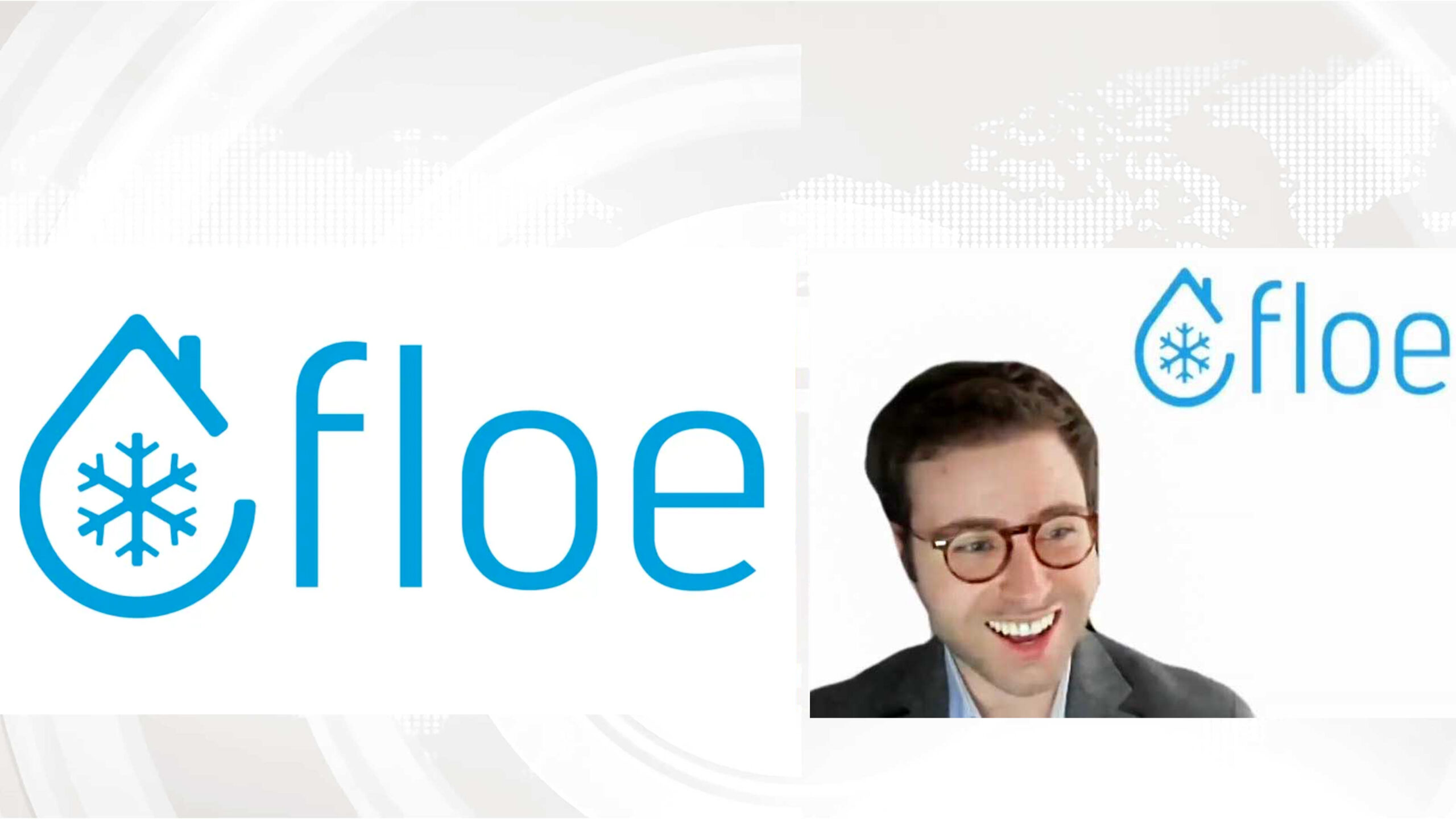
David Dellal, CEO and founder of Floe won the $100,000 grand prize for IoT solutions from Avnet at the 2021 ASU Innovation Open. Avnet, a global leader in electronic components and services, selected Floe for its innovative technology solution. Avnet is a founding sponsor of ASU Innovation Open, sponsoring $100,000 prizes to support student entrepreneurship since the competition’s inception five years ago.
“It’s my honor, on behalf of Avnet, to recognize the creativity and talent. I feel really good about this next generation and what’s to come,” said Phil Gallagher, the new Avnet CEO. The future’s really bright. We look forward to offering our global design services to you as you grow “Avnet’s going to be right there with you helping to bring some of these ideas to life.”
Sophia Wennstedt, the CEO and co-founder of blip energy, accepted the $100,000 Climate Change prize sponsored by Breakthrough Energy Ventures. Blip is a residential energy storage company focused on democratizing energy storage and accelerating the adoption of renewable resources. Uniquely, blip is currently catered to helping renters, who comprise 36% of U.S. households, save money on their energy bills.
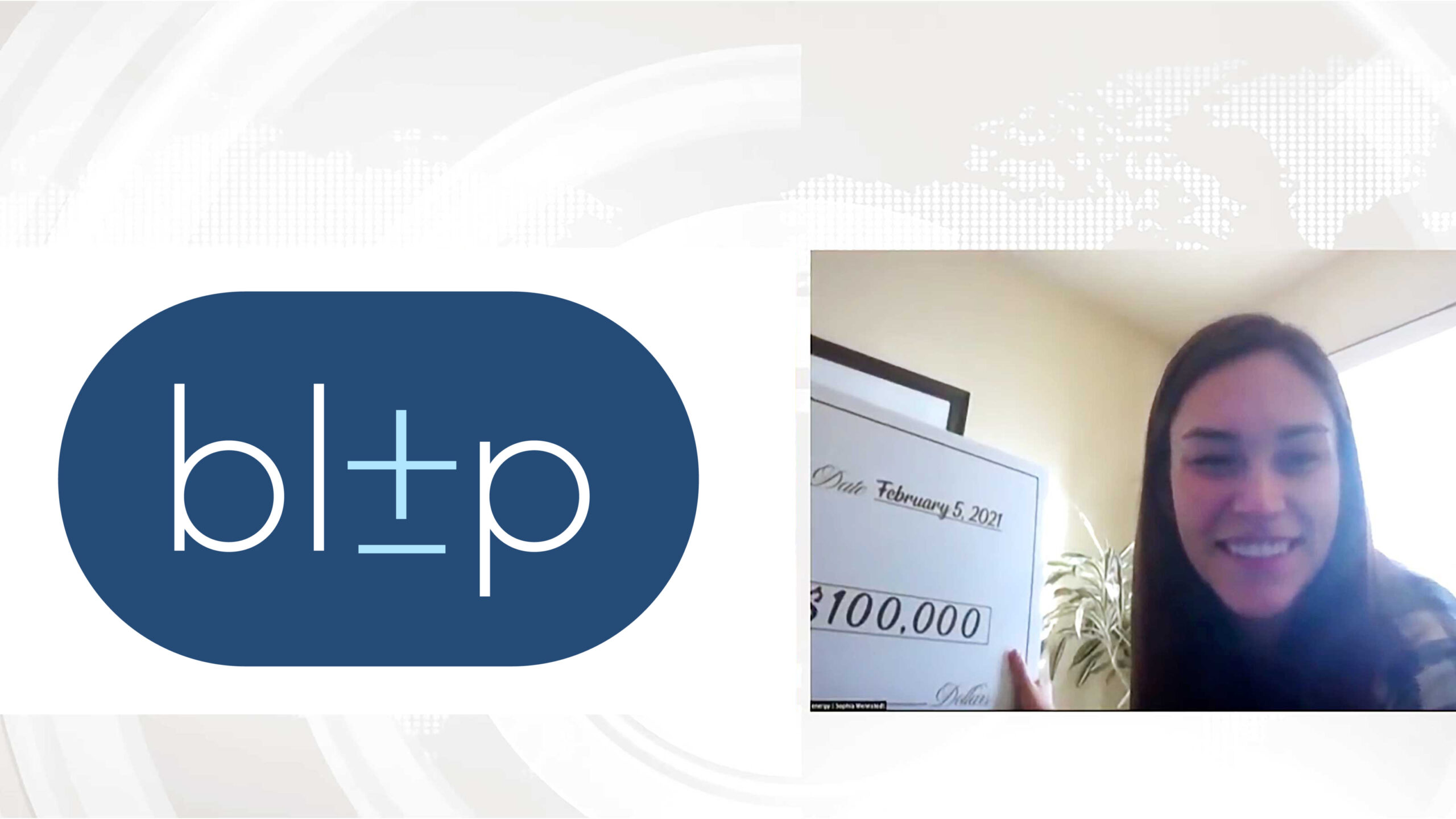
Sophia Wennstedt, CEO and co-founder of blip energy, accepted the $100,000 Climate Change prize sponsored by Breakthrough Energy Ventures at the 2021 ASU Innovation Open. “Our goal is to expand access to energy storage,” said Wennstedt. “We’re doing that by providing an affordable, accessible residential smart battery that, at scale, will also help utilities begin to reduce their reliance on dirty peaker plants. We believe that everyone has the right to energy storage. It’s the future and it’s the key to a stable grid. And we are, to my knowledge, the first folks who are delivering it at this price point by using second-life lithium-ion batteries.”
Breakthrough Energy Ventures, a $2 billion investment fund by Bill Gates, helps advance game-changing innovations and technologies to address climate change.
Libby Wayman, an investor at Breakthrough Energy Ventures and last year’s ASUio keynote speaker had a special message for the student innovators.
“We’re just so thrilled to be a part of ASUio. Entrepreneurs like all you guys in this competition — you guys can do more than just be good at what you do. You see the world and you see how it can be better and how it can change, and then make that happen,” Wayman said. “And that’s really special. Change doesn’t happen without big ideas and without people like you pushing them forward.”
The other 2021 ASUio winners were:
- Nutrivide of Rutgers University, who won the $5,000 AWS Prize sponsored by Amazon Web Services. The prize was presented to Clairisse Whang and Akshay Kamath who have produced an infant nutrition pacifier. Their company aims to enhance quality and convenience in the infant care process, reduce plastic waste in products and packaging, and offer affordable solutions for all parents.
- Cynteract GmbH won the Hardware Engineering Prize sponsored by ASU eSeed and SilSync, earning $25,000 cash and $25,000 in-kind design services. Gernot Sümmermann of RWTH Aachen University accepted the prize on behalf of ASUio’s first global finalist. Cynteract brings gamification to rehabilitation with a sensor-enabled smart glove.
- Jama Mohamed, founder of Sahara Cloud, won $25,000 cash and $10,000 in AWS credits for the Amazon Alexa Prize sponsored by Amazon Alexa + Amazon Web Services. Sahara is a cloud-based platform that allows developers to virtually access physical boards and sensors to test equipment in the cloud without the need to physically acquire hardware components.
- Nitricity’s cofounder Nicolas Pinkowski of Stanford University accepted the ON Semiconductor $25,000 cash Transform Your Thinking Prize. Nitricity produces on-site fertilizer using air, water and solar electricity to allow owners of irrigated farms to decrease their fertilizer, acid and labor cost by $200 per acre.
Ranked as the nation’s most innovative university for six consecutive years by the U.S. News & World Report, ASU is the ideal university to host a competition of this caliber. ASUio competitors are undergraduate and graduate students who are generally beyond the idea stage of their venture. Many have developed prototypes, and some even have early pilot customers. At ASUio, competitors get to share their adaptive, scalable real-tech ventures to the ASU entrepreneurial community.
Danya Sherman won the $25,000 Social Equity Prize in last year’s competition for her company KnoNap, which develops discreet gender-inclusive diagnostic tools that help prevent drink spiking. She has since been named to Forbes’ 30 Under 30 list for social entrepreneurship and has raised even more capital for her venture. Sherman returned to the competition this year to offer advice and share her experience with the newest round of competitors as part of the show.
ASUio viewers were also treated to an insightful keynote conversation between ASU Director of Design Integration Cheryl Heller, and Ivy Ross, the vice president of hardware design at Google. Creation and design are inherently part of entrepreneurship. Ross suggests founders keep a few things in mind as they innovate.
“First you have to put yourself in the position of observing problems,” she says. Then ask “what problem am I solving that no one has solved before? Or how can I do what’s already being done that much better?”
Along with getting guidance from some of technology’s most influential voices, students in the competition also get support from generous sponsors and dedicated mentors who donate their time and resources to the ASUio competitors. Alongside the prize sponsors, representatives from several entities participated as mentors, including experts from Altium, Amazon, the Arizona Commerce Authority, August United, Mayo Clinic Arizona, Solid Works and GoEngineer, SRP, Theil Capital and Zenni Optical among others. ASU sponsors also include the Fulton Schools of Engineering and the Arizona Board of Regents, with additional support from ASU’s J. Orin Edson Entrepreneurship + Innovation Institute, the ASU Mayo MedTech Accelerator, and the ASU Knowledge Enterprise.
This year, winners can look forward to yet another opportunity exclusive to the ASU Innovation Open experience. ASUio is collaborating with Entrepreneur Media to have a select group of ASUio winners participate in the hit reality series Entrepreneur Elevator Pitch. The show has garnered more than 156 million series views across Entrepreneur.com across multiple platforms in the show’s past six seasons.
Stay tuned for more news about ASU Innovation Open on the ASUio website, and watch a recording of the live competition on YouTube.
- ASU Innovation Open announces 2021 semifinalists
 FOR IMMEDIATE RELEASE: December 23, 2020
FOR IMMEDIATE RELEASE: December 23, 2020ASU Innovation Open announces 2021 semifinalists
Student innovators from universities around the world to compete for $300,000 in cash prizesASU Innovation Open has announced the semifinalists Arizona State University’s most exciting pitch competition. These top collegiate innovators will pitch their ventures for a chance to win up to $300,000 in cash prizes, including two $100,000 grand prizes. The virtual event will be Friday, February 5, 2021.
Powered by ASU’s Ira A. Fulton Schools of Engineering, Avnet and Breakthrough Energy Ventures, ASU Innovation Open is designed advance student-led startups harnessing the power of entrepreneurship to tackle the world’s most challenging problems. Throughout the competition, ASUio sponsors and supporters will provide critical venture mentorship, coaching and funding to the competitors whose ventures focus on conscious capitalism.
This year, ASUio saw the highest number of applicants in the competition’s five-year history. And as the competition grows, its applicants reflect the increasing diversity among young innovators in the entrepreneurial space. This year, 60% of the ventures applying for the ASUio are minority-led, and women are at the helm of a full third of the startup teams.
In February, 30 semifinalist teams will pitch their leading-edge hard tech and IOT solutions to a panel of startup and industry leaders whose expertise spans areas like artificial intelligence, autonomous transportation, agricultural and climate technology, health care, photovoltaics, wearable technology and more.
The 2021 ASU Innovation Open semifinalists are:
- AAVAA – Carnegie Mellon University
- Ai-Ris LLC – Texas A&M University
- Atomic AI – University of Pennsylvania
- Aurign – Georgia State University
- Aurora Medical Systems – Northeastern University
- Beyond Acoustic Technologies – University of California, Los Angeles
- blip energy – Northwestern University
- Cynteract GmbH – RWTH Aachen University
- Eden GeoPower, Inc. – Massachusetts Institute of Technology
- EqualComm LLC – Arizona State University
- Eyesbox AI – Arizona State University
- Floe – Yale University
- FloWaste, Inc. – University of Notre Dame
- Harmony Desal – Massachusetts Institute of Technology
- Healixir Health – University of Utah
- Ichosia Biotechology – Northeastern University
- Ithemba, LLC – Johns Hopkins University
- Mount – Northeastern University
- Nitricity – Stanford University
- Notos Technologies – McGill University
- Nutrivide Inc. – Rutgers University
- Optical Waters LLC – Arizona State University
- Padma Agrobotics LLC – Arizona State University
- PhenoLogic – Michigan State University
- Sahara Cloud, Inc. – University of California, Los Angeles
- SeebeckCell Technologies – University of Texas
- Sensory Robotics – University of Pennsylvania
- SteeroFlex – University of California, San Diego
- Verdant. Innovatives – University of Maryland, College Park
- ZeroDK Inc. – University of Pittsburgh School of Dental Medicine